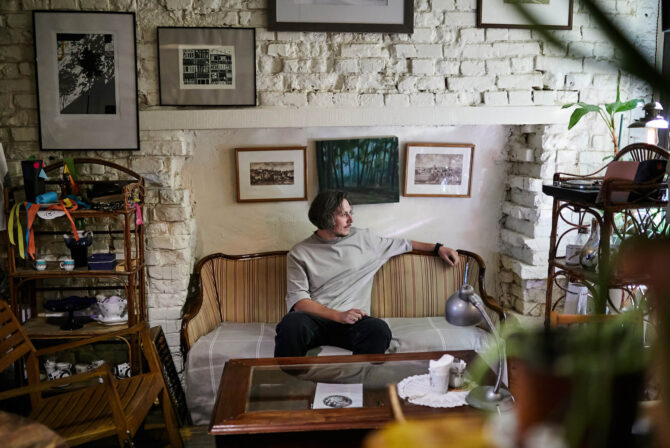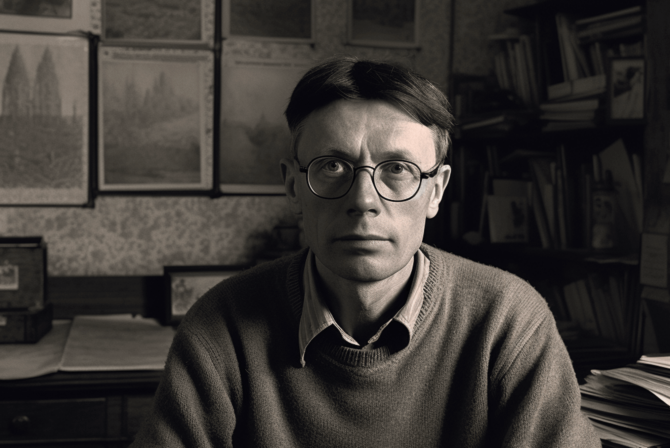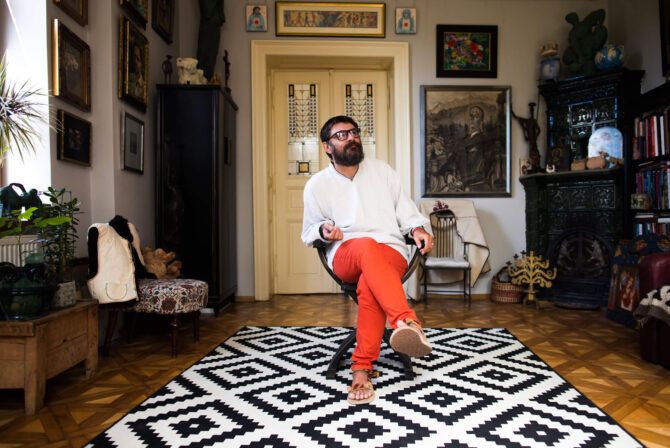The Ukrainians Media is an award-winning independent media company focusing on high-quality, long-form, and visual journalism. Our mission is to foster positive social changes in Ukraine.
This story was created thanks to the support of our readers. Please join The Ukrainians Community on Patreon and help us publish more important and interesting stories.
My grandmother spoke to milk, dough, and vegetables. Dough was a story of its own because only with it grandma spoke in whispers and secretly, and even prayed over it on the eve of Easter.
With milk, she argued loudly, “What a shame! I just turned away for a moment, and you spilled. Didn’t you like the pot or what? Oh, how shameless you are!”
With beets, she negotiated: “Give me some sugar for the borscht, so I don’t have to sprinkle more on top. Come on, come on, you can do better than that!”
With jam and its foam, with bay leaves, she wondered: “How is it that you have grown so little?” She also spoke with blood pudding and lumps in the porridge… She cajoled, thanked, scolded, and apologized when she was unfair.
No one in our family thought this was madness. Later, I established relationships with cups, spoons, and tartan blankets myself… In 2014, just before the Russian invasion, we paid off our new apartment in Donetsk and finished furnishing it. I communicated with it in a festive or friendly way: “I bought gifts for our kitchen,” “This flower feels sad, all alone on the windowsill—I hope the rubber plant makes friends with the orchid,” “Don’t stick to my feet so much—I’ll wash you now…” The last sentence was addressed to the floor.
I know I am approaching my subject in a roundabout way, but I just cannot take a shortcut. Maybe I want to encircle it. But this encirclement is not for an enemy but for the love for which I need to find words.
In one of the supermarkets, you can buy or order all kinds of equipment and tools necessary for the front and the rear. My colleagues and I often go there. We want to get it done as quickly as possible, but we know that one of us always gets lost. We find her in the most unexpected departments. For example, near the paints. She asks the clerk to mix her two shades of beige and light yellow. Then she looks at the color and says, “No, that won’t work. I need to do some more thinking.” Or she can hang around the department with wallpaper, baseboards, tile, and laminate floors. She takes photos and makes notes.
Our colleague is a native of Izyum. The apartment she lived in no longer exists, but she is redecorating it in her imagination. The apartment that will be rebuilt one day.
This is what she always tells us: “I will not skimp on the beauty and quality. I still have some time to earn enough money to do all this.”
Somewhere here, between my conversations with cars (“Come on, sweetie, we really need to get going!”) and a piece of corrugated cardboard that will not fit in a can (“You are not the only one here. Everyone else fits in, and you are throwing a tantrum!”)…. I hope our grandchildren will not understand what the can and the corrugated cardboard were all about. I firmly believe they won’t.
***
Between the imaginary renovations of destroyed apartments and the promises made to oneself to put solar batteries on all the houses in a non-existent village, between the clear messages from across the border and even the ocean: “I only want to live in Ukraine”—somewhere in between there is this most important thing that I want to encircle with words so that it does not run away from me.
Wormwood
Behind the horizon, the sky should have been looming, but instead, a chimney of a steel plant was sticking out. In front of the apartment block, an alley should have been paved, but instead, dark water that almost never evaporated from the puddle was glistening. At the corner of Street A. and Street B., where A. and B. were the names of strangers and sometimes our enemies, the trolley bus always bounced hitting the potholes so high as if it were participating in the steeplechase. The mayor, a stupid coward, promised a heaven on earth but always started with building a palace for himself first. Or a fountain with the figures of fake ancient Greek bathers. The fountain never worked, but it was there.
But other things grew alongside, sometimes quickly, sometimes quietly: soccer fields, pretty coffee houses, children’s playgrounds, startup workspaces, farms with their own agricultural aircraft, co-workings, parks, pedestrian zones, colorful apartment blocks in the suburbs…
But even if they did not grow. Even if they did not.
In August 2015, a year after I fled the Russian world, I went to Kramatorsk. If you consider a hundred kilometers a negligible distance, you could say I went home. Almost.
The cross ties smelled of coal and tar. The windows of the train carriage were sealed. But in the toilet, which was old but not yet ancient, there was a bowl. What mattered most about it was the pedal. You pushed on it, and a hole opened. Through the hole, you could see the tracks. And also the air flew in through the hole. Now you can laugh, hold your nose, or demand less graphic detail and more respect—but that’s the way it was. Sorry, people who live clean and righteous lives and never get off their high horse. I know you’ll never stand still over a hole out of which the air carried over by the wind from an old coal mine spouts. From an old abandoned coal mine where the coal looks like kittens that have rolled around in the soot. And at the station it smelled like sagebrush in the morning and wild chamomile in the evening.
Wormwood. Like what Mykola Voronyi wrote about. You smell it—and you rise, you ‘jump to your feet.’
Before the war, it seemed that all this—the roofs, the squares, the chipped sidewalks, the smell of leaves, the drifts of snow on the roadside, the darkness in the suburbs… It seemed that it was impossible to love all this.
And then it turned out they were like your arm, leg, back, or neck. Who would ever wonder, “Do I love my leg?” But it’s hard to live without it, sometimes impossible. It looks like globalization has been reducing the concept of home to nothing. The world is open for relocation, job hunting, travel, and change. But the spirit that makes you jump up, the wormwood, now puts all things back in the places where they belong.
And these places are our love. The places full of smells, food, chairs, tartan blankets, pillows, cups, wallpaper… And more: roads, bridges, cars, gas stations, playgrounds. And some more: the horizon, the rain, the sea, the steppe, the forests. And much, much more: the people.
“A cherry orchard by the house” is not about kitsch or admiration of a traditional lifestyle removed from the modern world. An orchard is a work that offers you beauty, nourishment, joy, and a conversation partner to whom you can always say something like, “I’m not going to make jam out of you anymore if you are like this. Next year I’d rather use apricots.”
To be a Ukrainian means to love in such a way that you see the whole world around you alive. And now it’s not just about seeing; it’s about making the whole world come alive.
It is our privilege to have a home and a country that, even now, when it is ruined, looted, and raped by missile craters, makes us want to buy wallpaper, garden seeds, and curtains for broken windows right now. It is an honor to have a country that always commands us to live, no matter what.
Olena Stiazhkina, writer, habilitated doctor of history, author of the novel Cecil the Lion’s Death Made Sense, founder of the “De-occupation, Homecoming. Education” public movement, member of PEN Ukraine.
Translated by Hanna Leliv.
The Ukrainians Media is an award-winning independent media company focusing on high-quality, long-form, and visual journalism. Our mission is to foster positive social changes in Ukraine.
This story was created thanks to the support of our readers. Please join The Ukrainians Community on Patreon and help us publish more important and interesting stories.





